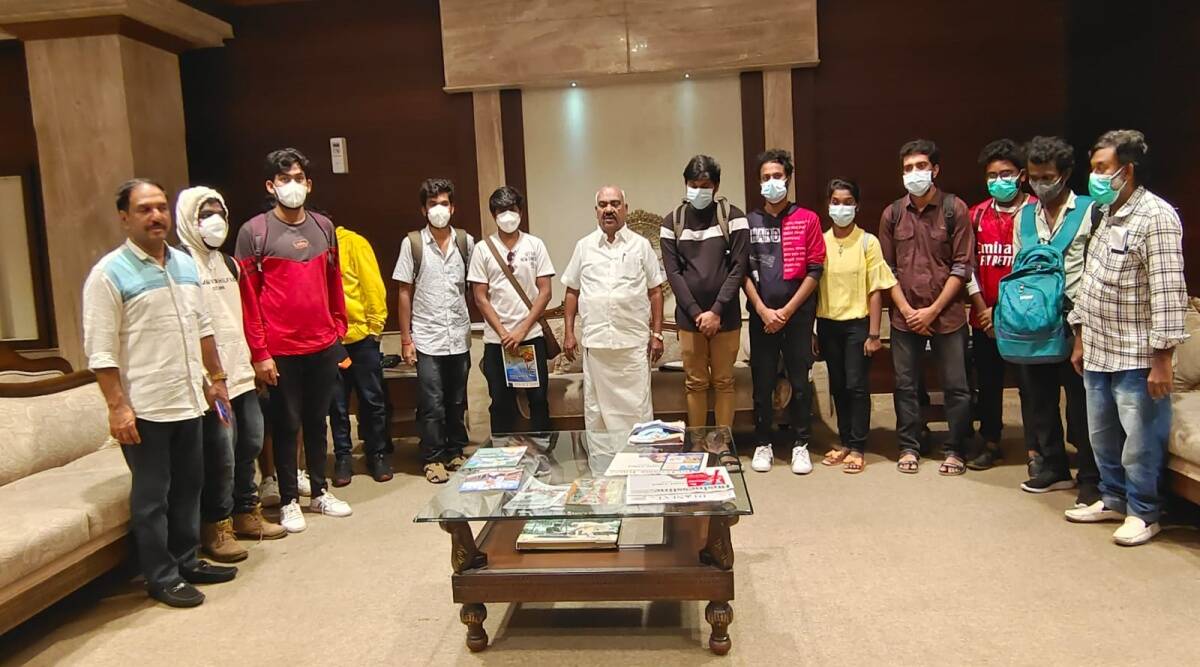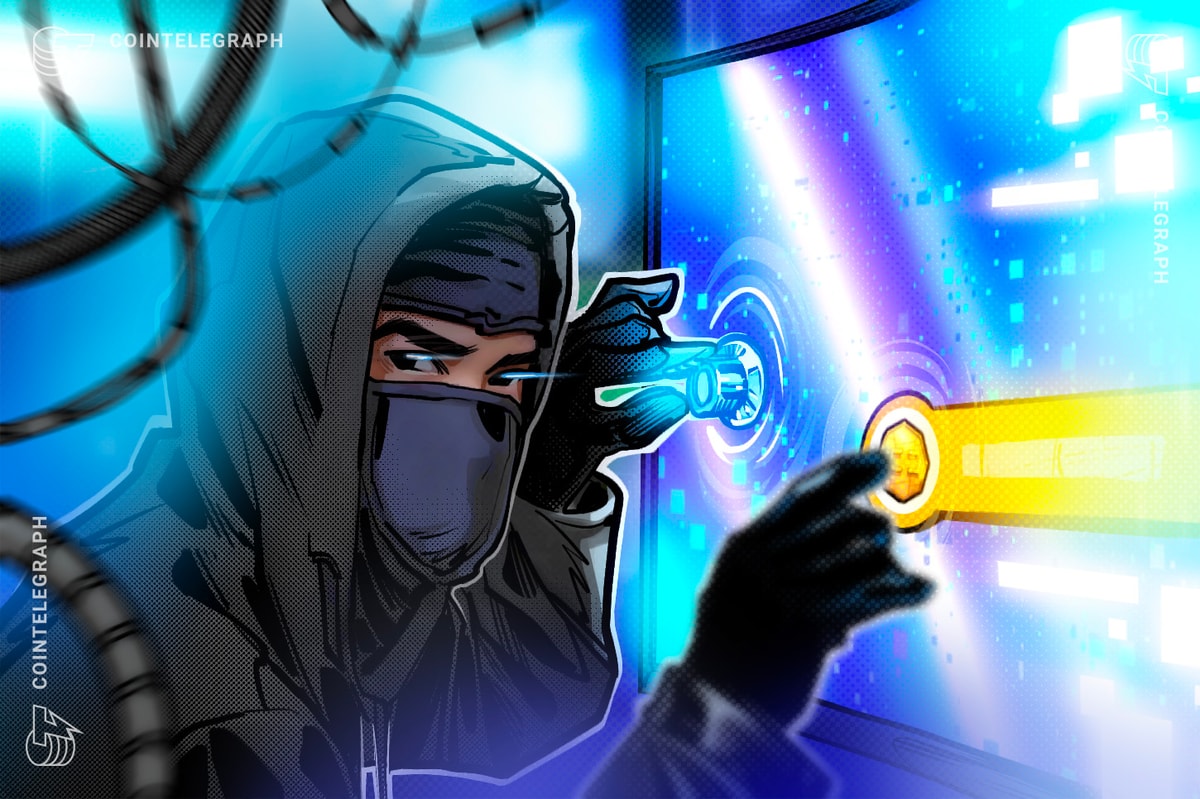The promise of a job in Thailand, a boat ride across the border to Myanmar and a sinking realisation that he had been scammed — that his dream job was all about scouring the deep, dark web for potential victims to carry out financial frauds.
Stephen, 29, part of a batch of 13 people from Tamil Nadu who were rescued from Myawaddy in southeastern Myanmar’s Kayin state, in pockets controlled by armed rebels, returned home on Wednesday with stories of his days spent in captivity in a company engaged in online scamming. An official attached to the Ministry of External Affairs, who didn’t want to be named, said around 300-500 Indians, including women, are still suspected to be trapped in Myanmar. Most of them, said sources, are from Tamil Nadu and Kerala.
Talking to The Indian Express, Stephen, an engineering graduate who identified himself only by his first name, said it was an agent called ‘Diana’, originally from Pudukkottai in Tamil Nadu but settled in Dubai, who contacted him, through a friend, with a job offer — that of a graphic designer in Thailand. He was told that he would have to pay a commission of Rs 2 lakh to the agent. Stephen left India for Thailand in the third week of July.
After reaching Bangkok, Stephen, along with six others from his state, were taken to Mae Sot, a city in western Thailand that shares a border with Myanmar. “We reached there at midnight after travelling some 400 km. A truck came and took us to a river side, where we got on to boats to cross the river. Armed men in military uniforms clicked our photos, collected our details. Before sunrise, we were taken to a compound where huge buildings were being constructed. That was the company we worked in for over the next 2-3 weeks,” said Stephen.
He says that their workplace had people from different nationalities — China, Russia, Thailand, Pakistan, Uzbekistan — but since around 60 per cent of workers and managers were Chinese, Indians communicated with them via the Telegram app. “We would type out our queries in English and get it translated to Chinese. They did the same with us,” he said. This continued until an Uzbekistan national, fluent in Chinese and English, joined them as translator.
According to Stephen, the group was mainly engaged in crypto scams. “There was a training session to begin with. We started targeting our potential prey through Facebook, Instagram, LinkedIn, and all sorts of social media.”
Besides financial scams, the workers were given paid versions of prominent dating apps, he said. “We would approach the client and sit with a model from Thailand. She would turn on the camera on request while we chatted with the clients. After we did this for about 15-20 days, we would get a sense of the customer’s tastes, habits and financial details. At one point, we were given 3,000 Indian VIP contacts — their names and cellphone numbers — whom we had to target. We were supposed to chat with at least 40 people a day,” he said, adding that they worked 15 to 16 hours a day.
There were punishments, too, if they got things wrong at work, says Stephen, adding that he had heard of workers being given electric shocks. Though the Chinese nationals among the workers bore the brunt of these penalties, Stephen says he too was punished once. “A customer texted a Thai model asking what she was doing. I texted (on her behalf) that I was ‘having dinner’. I was later told that I was supposed to send a picture of my dinner instead of a text message. They spotted two or three other mistakes on my part and made me stand outside the factory for six hours,” he said. Though the salary promised to him was 1,100 USD, he says he was never paid as he was rescued before that.
Stephen says that while he was never happy with his work, the penalties and the punishment were the last straw. “They promised us that Indians would not be physically tortured. But some of us got together and insisted that we should be allowed to return to India. They asked for Rs 5 lakh from each of us, saying that was the amount they had spent to get us. They later settled on Rs 4 lakh. Finally, one of my colleagues paid that amount and got out. His father, who had retired from the Indian army, used his contacts, alerted authorities and managed to get the Myanmar army to come to our rescue,” he said.
Stephen says it took another week for them to get their passports back, after which they crossed the same river back to Thailand, walked several kilometres through a forest before being apprehended at a Thai Army checkpoint in the last week of August.
They would spend several nights in police lockups with other victims of human trafficking, before finally reaching Bangkok, and then Chennai on Wednesday.
Stephen says that now that he is back home, he worries for those still stuck there. “Our company wasn’t the only one… There were around 40 such companies in that locality and many more Indians are still trapped. I personally know of at least 15 of them. After some of us Indians began revolting, they began splitting our groups and sending people to different locations to avoid any kind of organised plan to escape,” says Stephen.
Jacintha Lazarus, Commissioner of Rehabilitation and Welfare of non-resident Tamils, said there are about 50 people from the state who are still trapped in Myanmar’s dark web firms. “Some 20 of them are in touch with us. We have shared their location and details with the Indian government and are trying to follow up. These scam companies are reportedly run by armed rebels to make money,” she said.
An official of NORKA ROOTS, a Kerala government department that works for expatriates, said, “We suspect many more Indians are trapped inside Myanmar territory. The modus operandi, as reported by the victims, is that IT-trained youth are offered well-paying jobs in Thailand by agents and touts. They are then brought to Thailand via Dubai or on direct flights from India on visa-on-arrival and taken via road to Mae-Sot on the Thai-Myanmar border. From there, they are illegally transported to secure, well-guarded enclaves run by Chinese mafia involved in online scams, crypto scams etc. The youth are made to work long hours, beaten and even forced to entice their friends (to join). The passports of these youth are kept by gangsters who operate the enclaves. The youth are forced to transfer $5000 in crypto currency if they want to return.’’
Officials said those rescued have reported that the enclaves are guarded by Chinese gunmen and that the whole area is under CCTV surveillance.
Even as the rescue operations are on, the illegal recruitments continue. While Stephen and the others were released on August 16, Rahul, from Kumbakonam, who completed Class 10 and a diploma in IT, left home on August 15, ostensibly to work in Chennai. “Later, we got to know that he went to Thailand with a friend. He went missing after that. He spoke to us yesterday… he is still trapped in a factory in Myanmar. He left with his friend Hari. We have sought help from the collector,” says his father, Rajendran.
Hari’s mother Kala, who works as a domestic help, says he spoke to her 10 days ago. “He completed his IT diploma and was working at a shop in Coimbatore selling water cans,” she said.
Sabnaj Saleem of Alappuzha, Kerala, has been waiting for his younger brother Sinoj, an engineering graduate, to return from Myanmar. “They had managed to escape from captivity after their employers promised Sinoj and the others that they would be allowed to cross the border back into Thailand. But on their way to the border, the handlers destroyed their mobile phones and abandoned them. Subsequently, they have all landed in the custody of the local police, who have slapped charges of illegal entry on them. For the last three days, we haven’t heard from Sinoj,” said Sabnaj.
Sabnaj says Sinoj paid Rs 1.20 lakh to land a “networking job” in Thailand and reached Bangkok on July 20 this year.
Raji, wife of another duped job-seeker, said her husband Nithin Babu was promised the job of a data entry operator. “He worked for one-and-a-half months, but got no salary because he missed work for a few days due to fever,’’ said Raji, who is from Varkala in Thiruvananthapuram.
Favas Saleem, brother of another youth in illegal custody in Myanmar, said, “My brother Hijas told me that there are several Indians in their camps, who are still in the custody of their handlers. Hijas had managed to escape, but it seems he has landed in police custody,’’ said Favas.
Read More: indianexpress.com









 Bitcoin
Bitcoin  Ethereum
Ethereum  Tether
Tether  XRP
XRP  Solana
Solana  USDC
USDC  Cardano
Cardano  Dogecoin
Dogecoin  TRON
TRON  Lido Staked Ether
Lido Staked Ether  Wrapped Bitcoin
Wrapped Bitcoin  Pi Network
Pi Network  LEO Token
LEO Token  Chainlink
Chainlink  Toncoin
Toncoin  USDS
USDS  Stellar
Stellar  Wrapped stETH
Wrapped stETH  Hedera
Hedera  Shiba Inu
Shiba Inu  Avalanche
Avalanche  Sui
Sui  Litecoin
Litecoin  Polkadot
Polkadot  Bitcoin Cash
Bitcoin Cash  MANTRA
MANTRA  Ethena USDe
Ethena USDe  Bitget Token
Bitget Token  WETH
WETH  Binance Bridged USDT (BNB Smart Chain)
Binance Bridged USDT (BNB Smart Chain)  Hyperliquid
Hyperliquid  WhiteBIT Coin
WhiteBIT Coin  Wrapped eETH
Wrapped eETH  Monero
Monero  Uniswap
Uniswap  sUSDS
sUSDS  Dai
Dai  Aptos
Aptos  NEAR Protocol
NEAR Protocol  OKB
OKB  Pepe
Pepe  Mantle
Mantle  Internet Computer
Internet Computer  Ethereum Classic
Ethereum Classic  Ondo
Ondo  Gate
Gate  Coinbase Wrapped BTC
Coinbase Wrapped BTC  Aave
Aave  Tokenize Xchange
Tokenize Xchange